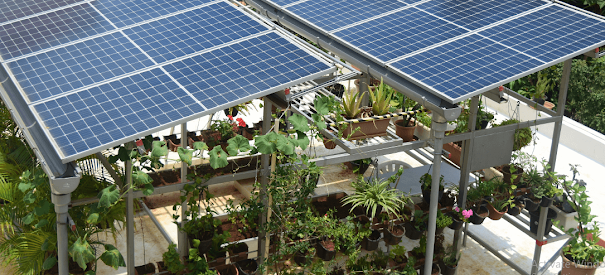AI, Solar and Farming!
Integration of AI, Solar Systems and Roof top Farming
Installing a solar rooftop has not one but multiple advantages.
1. It helps you make, use, and own power for your home.
2. An elevated solar rooftop structure also has other benefits—it provides shade so the roof and the subsequent area below it do not get heated, it prevents water seepage and leakage in the roof by acting as a protective cover.
3. It also provides a great opportunity to grow vegetables, greens, and flowers.
Elevated Solar Structure
Elevated Solar Structures are the creative solution to your energy needs.
An elevated solar structure is a type of solar installation that involves mounting solar panels on a structure above the roof of a building. It creates a shaded area beneath the solar panels for a variety of purposes, such as outdoor seating or storage.
One of the primary advantages of an elevated solar structure is that it provides an additional shaded area that can increase the usable space of a property. This type of solar structure is also creative and can add aesthetic value to your property. Elevated solar structures are standard for commercial buildings or residential properties with larger outdoor spaces.
Rooftop Farming – Best Solution for Urban Agriculture
Due to the rise in food demand (especially green vegetables and fruits) for urban occupants, the most advanced and efficient type of farming supplies healthy food production and progress in the food security of urban people. Rooftop Farming helps to grow food. It improves the urban environment by reducing pollution and gives rise to greenery.
Rooftop Farming is a suitable option for Urban Agriculture. It plays an important role in managing the urban environment and enhancing the quality of air with organic and fertilizer free production.
Benefits of Rooftop Farming
- Enhances urban landscape.
- Rooftop Farms help cool buildings and reduce carbon emissions.
- Minimizing the Chance of Pests.
- Improved Air Quality.
- Reducing Effect of Urban Noise.
- Access to Sunlight.
- Increase Access to Healthy Food.
Urban Horticulture
This is possible due to an artificial intelligence-based control system. This control system utilizes advanced technologies and algorithms to monitor, analyze, and adjust key environmental variables within the vertical farming facility.
- Robots and AI are beginning to automate vertical farming systems more efficiently.
Conclusion:
Integrating solar systems with rooftop farming not only maximizes the potential of urban spaces but also contributes to a more sustainable and resilient future for communities worldwide. This innovative combination exemplifies the power of holistic approaches in tackling pressing global issues such as food security, climate change, and energy transition.






Comments
Post a Comment